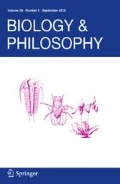Abstract
This article questions whether philosophical considerations play any substantial role in the actual process of scientific research. Using examples mostly from the nineteenth century, it suggests that scientists generally choose their basic theoretical orientation, and their research strategies, on the basis of non-rationalized feelings which might be described as instinct or intuition. In one case where methodological principles were the driving force (Charles Lyell's uniformitarian geology), the effect was counterproductive.
Similar content being viewed by others
References
Bartholomew, M.: 1973, ‘Lyell and Evolution’, British Journal of the History of Science 6, 261–303.
Bowler, P.J.: 1983, The Eclipse of Darwinism, Johns Hopkins University Press, Baltimore.
Browne, J.: 1995, Charles Darwin: Voyaging, Jonathan Cape, London.
Darwin, C.: 1958, Barlow, Nora (ed.), The Autobiography of Charles Darwin, Harcourt Brace, New York.
Darwin, C.: 1987, Barrett, P.H. et al. (eds.), Charles Darwin's Theoretical Notebooks, 1836- 1844, Cambridge University Press, Cambridge.
Hodge, M.J.S. and Kohn, D.: 1985, ‘The Immediate Origins of Natural Selection’, in Kohn (ed.), The Darwinian Heritage, Princeton University Press, Princeton, pp. 185–206.
Magnello, E.: 1999, ‘The Non-Correlation of Biometrics and Eugenics: Rival Forms of Laboratory Work in Karl Pearson's Career at University College’, History of Science 37, 7–106, 123-150.
Needham, J.: 1928, ‘Organicism in Biology’, Journal of Philosophical Studies 3, 29–40.
Rudwick, M.J.S.: 1990, ‘Introduction’, in Lyell, C. (ed.), Principles of Geology, rep. University of Chicago Press, Chicago.
Rupke, N.: 1993, Richard Owen: Victorian Naturalist, Yale University Press, New Haven.
Ruse, M.: 1979, The Darwinian Revolution, University of Chicago Press, Chicago.
Secord, J.: 1997, ‘Introduction’, in Lyell, C. (ed.), Principles of Geology, rep. Penguin, London.
Webster, G.: 1992, ‘William Bateson and the Science of Form’, in Bateson, W., Materials for the Study of Variation, rep. Johns Hopkins University Press, Baltimore.
Author information
Authors and Affiliations
Rights and permissions
About this article
Cite this article
Bowler, P.J. Philosophy, Instinct, Intuition: What Motivates the Scientist in Search of a Theory?. Biology & Philosophy 15, 93–101 (2000). https://doi.org/10.1023/A:1006672807518
Issue Date:
DOI: https://doi.org/10.1023/A:1006672807518



